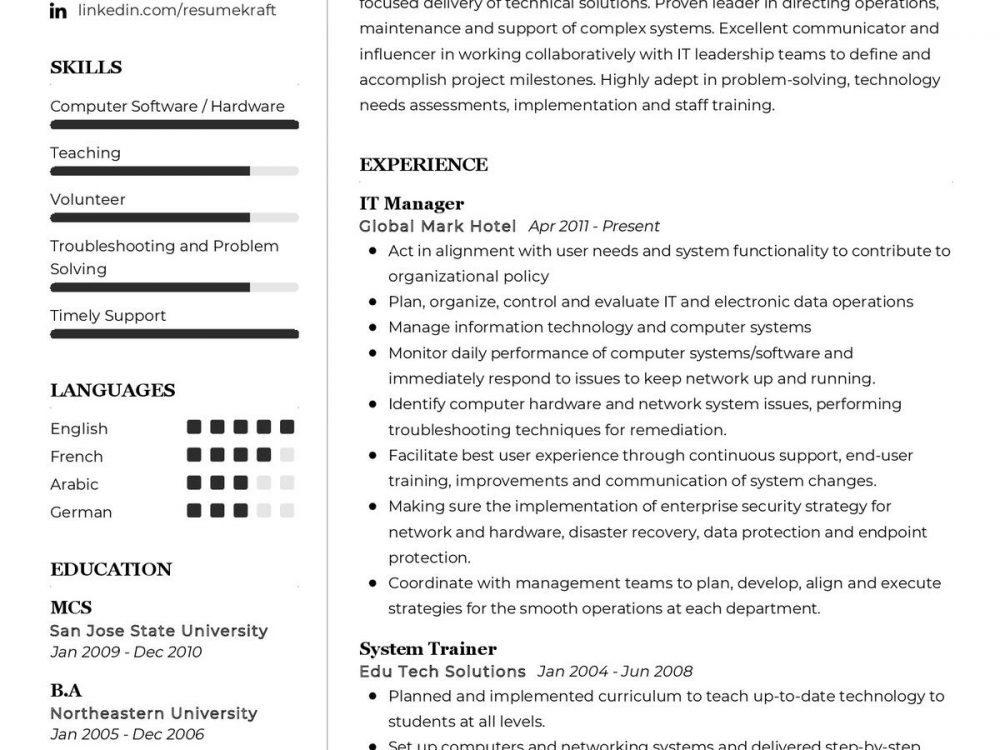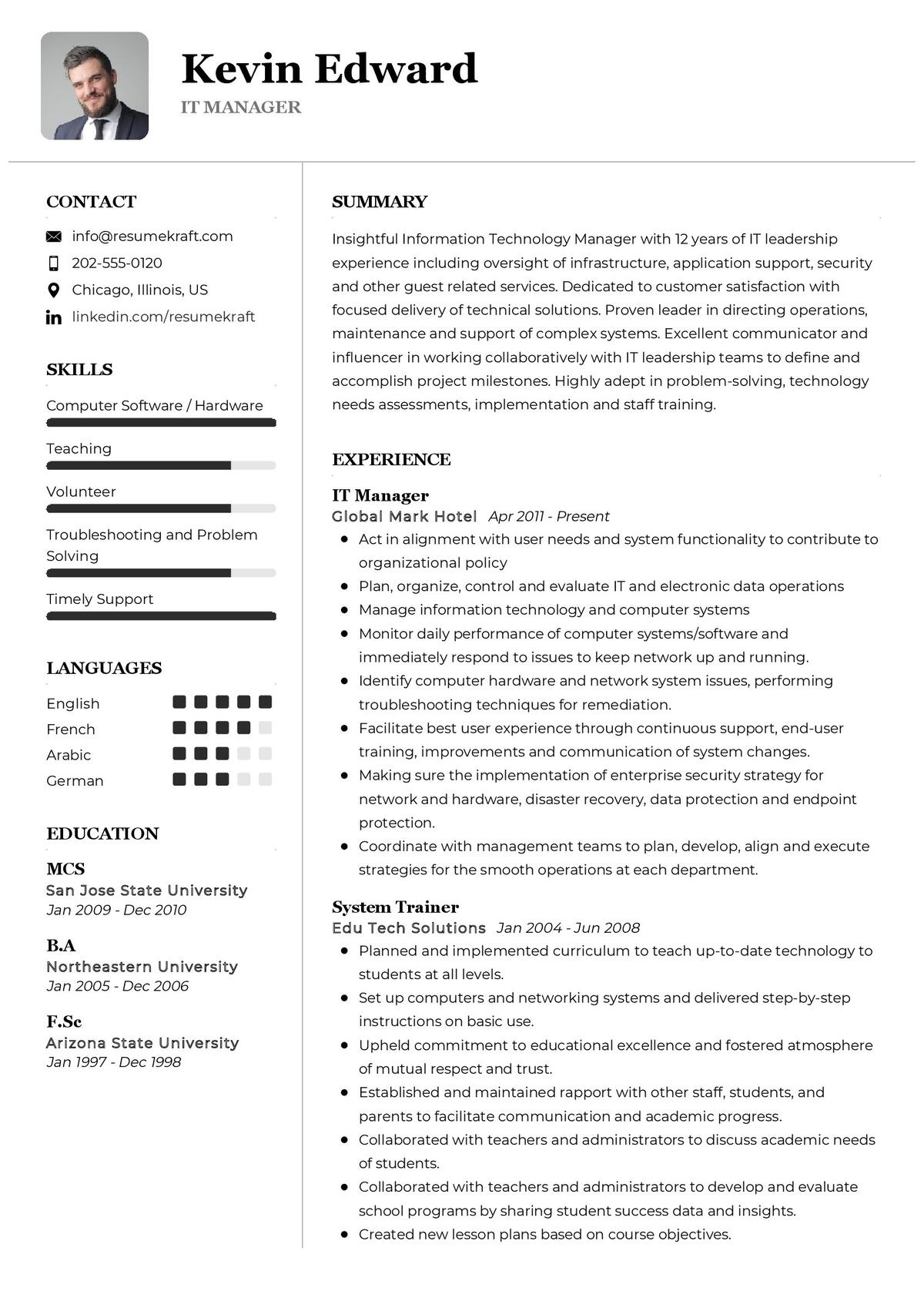What Should Be Included In A IT Manager Resume?
When it comes to writing a resume for an IT Manager role, it’s important to include the right information. An IT Manager is someone who is responsible for managing the entire IT infrastructure of a company. It’s an important role, so you want to make sure your resume reflects your knowledge and experience in the field.
In your resume, make sure you include your technical skills, such as software and hardware experience, as well as any certifications you may have. It’s also important to include experience managing projects, as well as any experience working in IT-related jobs in the past. Additionally, you should include any specialized experience you have, such as experience with virtualization, cloud computing, or cybersecurity.
Experience with analytics and reporting is also a useful skill to include on your IT Manager resume. Being able to analyze data and present it in a clear way is an important skill for anyone in a managerial role. Additionally, be sure to include any relevant experience with leadership and communication, such as demonstrating the ability to manage teams, communicate goals and objectives, and ensure that projects are completed on time and within budget.
Finally, you’ll want to include a list of any relevant professional accomplishments, such as cost-savings initiatives or successful implementations of new systems. This will demonstrate to potential employers that you have a track record of success. Make sure to include any awards or recognition you have received in the field as well.
By including all the necessary information in your IT Manager resume, you will have a much better chance of landing the job you desire.
What Skills Should I Put On My Resume For IT Manager?
Having the right skillset is crucial when you’re applying for an IT Manager role. As an IT Manager, you’ll be responsible for overseeing the planning and implementation of IT systems, so employers will be looking for candidates with strong technical, organizational, and leadership skills. Your resume should emphasize the skills that make you a great fit for the job, such as your experience with hardware, software, and network systems, your ability to troubleshoot technical issues, and your knowledge of IT security protocols.
When you’re crafting your IT Manager resume, it’s important to highlight the technical skills you have acquired through both education and experience. Potential employers want to know that you have a thorough understanding of the latest hardware, software, and operating systems, as well as the ability to troubleshoot any technical issues that may arise. Make sure to include any certifications or specialized training you’ve had, such as a CompTIA Network+ Certification or a Microsoft Certified Solutions Expert (MCSE) Certificate.
In addition to your technical skills, employers will be looking for candidates with strong organizational and leadership skills. You should be able to demonstrate your ability to lead a team, manage projects, and follow through on tasks. Be sure to include any experience you have with team building, time management, or budgeting. Employers will also be looking for candidates who understand the importance of IT security protocols, so include any experience you have with data security and disaster recovery plans.
By highlighting your technical, organizational, and leadership skills on your IT Manager resume, you’ll be able to show potential employers that you’re the ideal candidate for the job . With a CompTIA Network+ Certification or a Microsoft Certified Solutions Expert (MCSE) Certificate, you’ll have the credentials necessary to prove your expertise in the field.
What Is The Job Description Of The IT Manager?
An IT Manager is responsible for the overall management and performance of an organization’s Information Technology (IT) department. This includes providing leadership, direction, and guidance to their team, as well as developing and implementing strategies and policies that will ensure that IT systems are running smoothly.
The IT Manager will be the point of contact for all IT related issues, so they must have a comprehensive understanding of the functions of the organization and how they are related to the IT department. This includes a strong understanding of network infrastructure, software applications, database management, and system security. Additionally, the IT Manager must be able to identify potential problems and develop solutions to them, as well as provide specialized technical support for IT staff.
The IT Manager will also be responsible for ensuring that the IT systems are up to date with the latest technologies, as well as ensuring that all staff have the necessary skills and knowledge to work efficiently with the systems. They may also be in charge of planning and budgeting for IT projects, as well as overseeing the implementation and maintenance of new systems.
Ultimately, the IT Manager is responsible for making sure that the organization’s IT functions are running as smoothly and efficiently as possible. They must be able to stay up to date with the latest technologies and trends, and be able to quickly identify and resolve any issues that arise. Finally, the IT Manager must be able to lead their team and motivate them to succeed.
What Is A Good Objective For A IT Manager Resume?
When crafting your IT manager resume, having the right objective statement can be a powerful tool in getting the hiring manager to give your resume the attention it deserves. An objective statement should be succinct and to the point, but still provide enough detail that the reader knows exactly what you are looking for and why you are the right person for the job.
For the IT manager position, it is important to highlight your technical knowledge and ability to manage projects and teams. An objective should focus on how you can use your skills, knowledge, and experience to benefit the organization.
For example, your objective may read, “To use my expertise in information technology, project management, and customer service to lead teams and manage projects to success as the IT manager at ABC company.” This statement emphasizes your technical knowledge, as well as your ability to manage projects and teams.
Additionally, you may want to include a list of specific goals you would like to achieve in the role. This will demonstrate that you are a proactive and forward-thinking candidate. For example, “To use my expertise in information technology and project management to improve operational efficiency and increase customer satisfaction at ABC company.”
When crafting an objective statement, make sure to keep it clear and concise. This way, the hiring manager will easily recognize the value you will bring to their organization. The goal of the objective is to convince the reader that you are the right person for the job, so make sure to emphasize your qualifications and achievements.
What Are The Career Prospects In The IT Manager?
When it comes to career prospects, IT managers are in high demand. Companies rely on their expertise to handle the technical aspects of their businesses. From designing computer networks to managing employee access to company data, IT managers have a major role in keeping a company running smoothly. With the rise of digital technologies, the opportunities for IT managers have grown exponentially.
The job of an IT manager is to plan, coordinate and direct computer-related activities within an organization. They are responsible for selecting and implementing the most cost-effective IT solutions for their company. They must be able to handle multiple tasks at once and be willing to work with a variety of people.
IT managers must be able to think strategically to solve problems and meet the needs of their organization. They need to be well-versed in the latest technologies, such as cloud computing and artificial intelligence, to be able to provide the best solutions for their company. They must also have excellent communication skills to be able to explain technical concepts to non-technical people.
The job of an IT manager is highly rewarding, both financially and professionally. It offers a competitive salary and a chance to work in an ever-changing field. It also provides the opportunity to work with cutting-edge technologies and make a real difference in a company. With the right skills and experience, IT managers can find plenty of opportunities in the job market.
Key Takeaways for an IT Manager resume
Writing an effective resume for an IT Manager position can be tricky, as the role requires a range of technical skills, management and communication competencies. To ensure your resume stands out from the competition, there are several key takeaways to keep in mind.
First, focus on highlighting the successes and accomplishments you have achieved in past IT Manager positions. This helps to demonstrate your capabilities and shows potential employers that you are capable of taking on the role. Additionally, highlight any certifications or speciality knowledge that you may possess. This can help to set you apart from other candidates who may not have the same qualifications.
Next, ensure that you are clear and concise when listing your technical skills. Be sure to include specific software and hardware that you have expertise in, as well as any development tools or programming languages you may be familiar with. Additionally, list any IT-related certifications that you hold, as this can help to increase your credibility as an IT Manager.
Finally, emphasize any leadership and management abilities you possess, as these are important qualities in an IT Manager. Be sure to include any projects or initiatives that you have led in the past, as well as any staff members you may have managed. By demonstrating your ability to effectively manage and motivate a team, employers can easily see that you are a suitable candidate for the job.
By keeping these key takeaways in mind when writing your IT Manager resume, you can be sure that you put your best foot forward when applying for the role. With the right content and an eye-catching design, your resume can be the key to landing the job.



